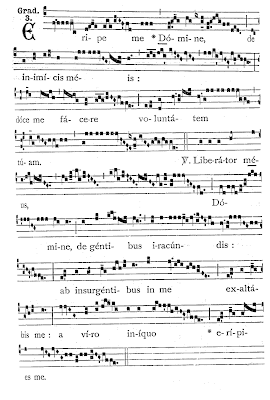Here is an mp3 of Eripe Me from the website of the Brazilian Benedictines, along with the JoguesChant translation:
Here's the chant score:
And here's Saepe Expugnaverunt (mp3) from Jogues, along with their translation and chant score:
The text for the Tract comes from Psalm 129, verses 1-4, another of the "Songs of Ascents." Verse 4 is translated "The Lord who is just will cut the necks of sinners" only in the Douay-Rheims version of this Psalm; the King James translates it this way: "The LORD is righteous: he hath cut asunder the cords of the wicked," as do most other versions. (The Good News Bible does it this way: "But the Lord, the righteous one, has freed me from slavery," and some others also follow this line about "freeing slaves.")
Here's a polyphonic version of the two chants together, from Romanus Weichlein (1652-1706):
And here's Josef Rheinberger's Eripe Me; Rheinberger lived from 1839-1902:
Rescue me, Lord, from my enemies; teach me to do your will. O Lord, you who save me from the wrath of the nations, you shall cause me to triumph over my assailants; you will save me from the man of evil.The text for the Gradual is taken from Psalm 143:9-10 and from Psalm 18:48-49.
Here's the chant score:
And here's Saepe Expugnaverunt (mp3) from Jogues, along with their translation and chant score:
Often have they fought against me from my youth. Let Israel now say: Often have they fought against me from my youth. Yet, they have not prevailed against me: my back has become an anvil for the hammering of sinners. They have long oppressed me with their iniquities. But the Lord of justice will break the neck of sinners.
The text for the Tract comes from Psalm 129, verses 1-4, another of the "Songs of Ascents." Verse 4 is translated "The Lord who is just will cut the necks of sinners" only in the Douay-Rheims version of this Psalm; the King James translates it this way: "The LORD is righteous: he hath cut asunder the cords of the wicked," as do most other versions. (The Good News Bible does it this way: "But the Lord, the righteous one, has freed me from slavery," and some others also follow this line about "freeing slaves.")
Here's a polyphonic version of the two chants together, from Romanus Weichlein (1652-1706):
And here's Josef Rheinberger's Eripe Me; Rheinberger lived from 1839-1902:








0 comments:
Post a Comment